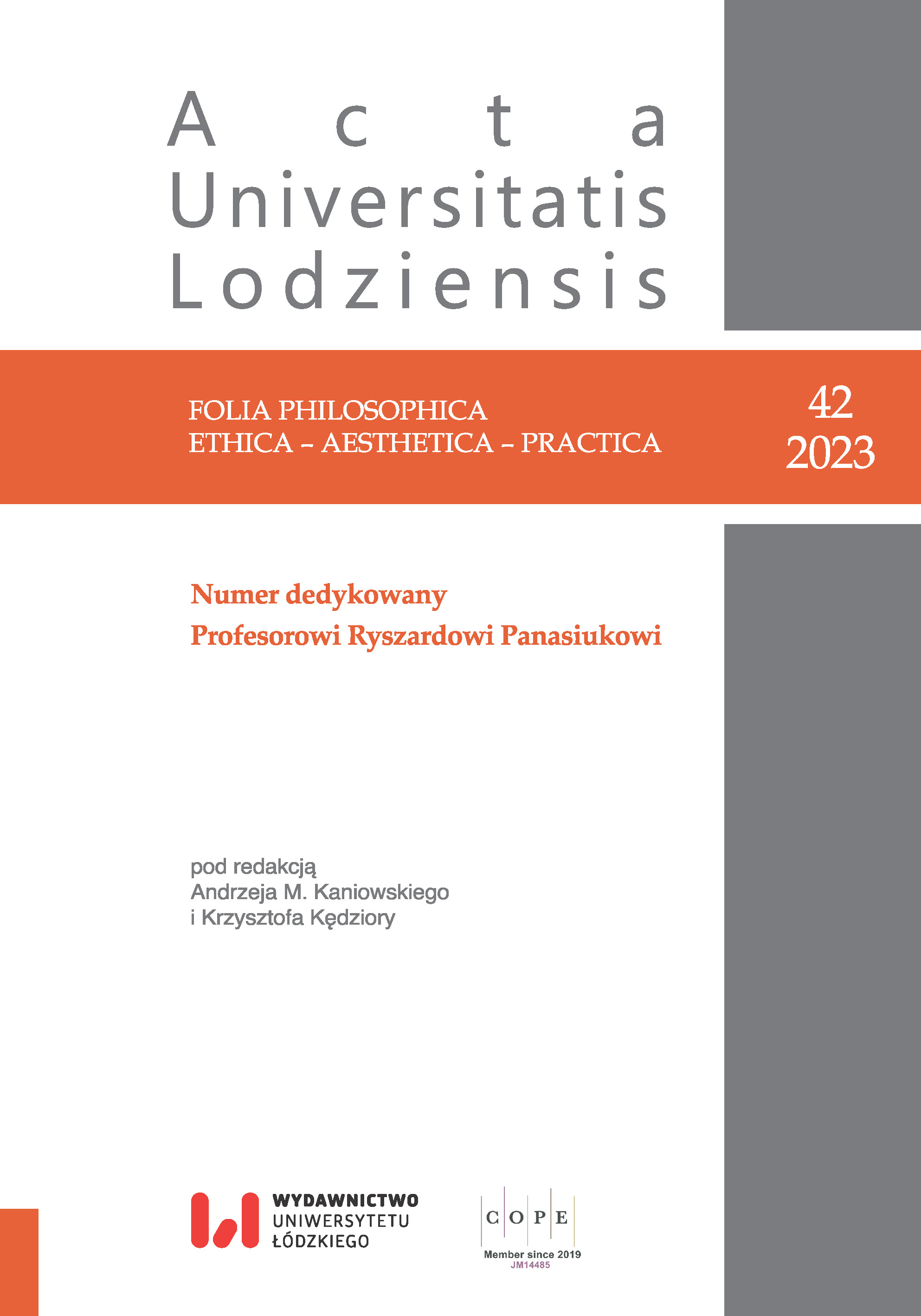Jürgen Habermas' Gattungsethik als Regelungsvorschlag für die biotechnologische Entwicklung
DOI:
https://doi.org/10.18778/0208-6107.42.03Schlagworte:
Habermas, GattungsethikAbstract
Według Jürgena Habermasa w warunkach eugeniki liberalnej ludzka samowiedza gatunku może ulec zmianie, dlatego należy wprowadzić regulacje, które pozwolą sprawować kontrolę nad wykorzystywaniem i nad rozwojem nowych biotechnologicznych metod. Zachowanie obecnej samowiedzy jest ważne, aby zapewnić podstawę dla funkcjonowania uniwersalistycznie pojmowanej moralności, pozwalającej osobom w sposób sprawiedliwy regulować swoje konflikty. Na dwie przesłanki samowiedzy gatunku składa się: postrzeganie siebie przez osoby jako wyłącznych autorów własnego życia oraz jako członków społeczeństwa, między którymi panują symetryczne relacje. Zachowanie takiej samowiedzy nie jest możliwe w sytuacji, gdy genetycznymi zadatkami jednych osób przed ich urodzeniem rozporządzali inni. Habermas proponuje, aby rozwój biotechnologii poddać regulacjom zgodnym z etyką gatunku, która jest rekonstrukcją warunków samowiedzy do tej pory przez nas posiadanej. Sformułowana przez niego etyka gatunku zakłada nierozporządzalność genetycznymi cechami nienarodzonych, jednak nie przesądza o stosowaniu genetycznych ingerencji w celach terapeutycznych, na które, według Jürgena Habermasa, można zakładać zgodę przyszłych osób, nie naruszając samowiedzy stanowiącej podstawę uniwersalistycznej moralności.
Literaturhinweise
Agar, N. (1998). Liberal Eugenics. North American Philosophical Publications, 12 (2), s. 137–155.
Google Scholar
Habermas, J. (1990). Discourse Ethics: Notes on a Program of Philosophical Justification. W: Habermas, J., Moral Consciousness and Communicative Action. Cambridge–Maldon: The MIT Press, s. 43–115.
Google Scholar
Habermas, J. (1992). Themes in Postmetaphysical Thinking. W: Habermas, J., Postmetaphysical Thinking: Philosophical Essays. Cambridge–London, The MIT Press, s. 28–53.
Google Scholar
Habermas, J. (1993). On the Pragmatic, the Ethical, and the Moral Employments of Practical Reason. W: Habermas, J., Justification and Application: Remarks on Discourse Ethics. Cambridge–London: The MIT Press, s. 1–17.
Google Scholar
Habermas, J. (2001). Die Zukunft der menschlichen Natur. Auf dem Weg zu einer liberalen Eugenik?. Frankfurt am Main: Suhrkamp Verlag.
Google Scholar
Habermas, J. (2003). Przyszłość natury ludzkiej. Czy zmierzamy do eugeniki liberalnej?. Tłum. Małgorzata Łukasiewicz. Warszawa: Wydawnictwo Naukowe SCHOLAR.
Google Scholar
Habermas, J. (2021). Once again: On the relationship between morality and ethical life. European Journal of Philosophy, 29 (3), s. 543–551.
Google Scholar
DOI: https://doi.org/10.1111/ejop.12716
Harris, J. (2021). Poprawianie ewolucji. Argumenty etyczne za tworzeniem lepszych ludzi. Tłum. T. Sieczkowski. Łódź: Wydawnictwo Uniwersytetu Łódzkiego.
Google Scholar
DOI: https://doi.org/10.18778/8220-228-1
Kant, I. (1995). O porzekadle: To może być słuszne w teorii, ale nic nie jest warte w praktyce; Do wiecznego pokoju: projekt filozoficzny. Tłum. Mirosław Żelazny. Toruń: Wydawnictwo COMER.
Google Scholar
Kędziora, K. (2022). Powściągliwość myślenia. W: Gensler, M., Gralińska-Toborek, A., Kazimierska-Jerzyk, W., Kędziora, K. (red.), Practica et Speculativa, Łódź: Wydawnictwo Uniwersytetu Łódzkiego, s. 141–158.
Google Scholar
DOI: https://doi.org/10.18778/8220-570-1.08
Spaemann, R. (2022). To, co naturalne. Eseje antropologiczne. Łódź: Wydawnictwo Uniwersytetu Łódzkiego.
Google Scholar
Żuradzki, T. (2014). Nowa liberalna eugenika: krytyczny przegląd argumentów przeciwko biomedycznemu poprawianiu ludzkiej kondycji fizycznej lub umysłowej. Diametros, 42, s. 204–226.
Google Scholar
Downloads
Veröffentlicht
Versionen
- 2023-12-04 (2)
- 2023-07-21 (1)
Zitationsvorschlag
Ausgabe
Rubrik
Lizenz

Dieses Werk steht unter der Lizenz Creative Commons Namensnennung - Nicht-kommerziell - Keine Bearbeitungen 4.0 International.












